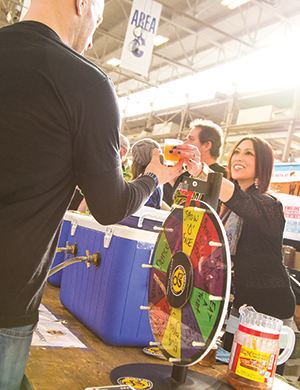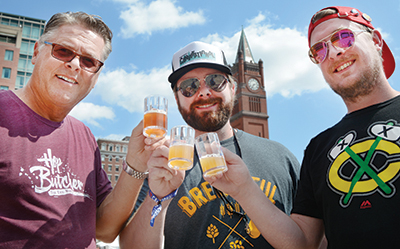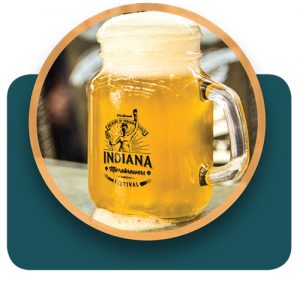
Natalie Wood and Nick Arcoleo say “Cheers!” at September’s CANvitational in downtown Indianapolis. All proceeds from Sun King Brewery’s annual celebration of canned craft beers went directly to eight nonprofit organizations serving the Indianapolis area.

How it may have looked on the night of March 31, 1880, when the arc lights first came on — as a little boy holding onto his cap gazes in wonder at the sky around the Wabash County Courthouse.
For a link to a story on the historic Wabash lighting, click here.
Shortly after opening a taproom in downtown Wabash last March, Chapman’s Brewing Company shed a totally different light on “light beer.” And it had nothing to do with quaffing fewer calories.
Tapping into Wabash’s claim as “the world’s first electrically lighted city,” the town’s newest beer hall sponsored “Pints for Power.” Thirty-one percent of its proceeds from March 31 paid the electric bills of local residents who were having trouble making ends meet and were in jeopardy of having their power shut off.
“Pints for Power was our first way to show Wabash that we really mean it when we say we want to help our communities grow,” said Zach Bohner, manager of Chapman’s Wabash taproom.
The taproom had opened for business just two weeks earlier in a completely restored historical building that began life as a livery stable in 1837. So, Bohner, a Wabash native, quickly cobbled together the themed fundraiser for Wabash’s “Electrification Day.”
Wabash’s international claim to fame was sparked just a few blocks out the taproom’s front door. On the drizzly evening of March 31, 1880, four electric carbon-arc lights powered up atop the Wabash County Courthouse and, for the first time, as the Wabash Plain Dealer reported that day, commenced “shedding their effulgence over the hitherto dark streets of the city.”
Mounted to the flagpole rising from the courthouse clock tower and dome, the lights sustained electrical arcs. Their blinding glow threw light on the downtown below — all the way to the Wabash River — and neighborhoods in all directions. The four experimental lights lit the city so well, Wabash effectively earned the pioneering electrification title.
Pints for Power raised $1,185 to honor that day by helping folks out. “And we were absolutely thrilled,” Bohner said.
He then worked with a local organization that helps families in need to get their account numbers to pay their outstanding bills at Duke Energy, the power supplier to the city. “The families were able to remain anonymous, and they never knew who it was who helped them in their time of need,” Bohner added.
Tapping in
Chapman’s Pints for Power is typical of the good cheer shown by the small, independent craft breweries that have popped up all over Indiana, and really the entire nation, in a short time.
Just about five years ago, In 2011, there were only 46 craft breweries in Indiana, according to the Brewers of Indiana Guild. By 2016, that number number had grown to 128. Nationally, there are now over 5,300 small breweries. Indiana ranks 15th nationwide in number. The industry accounts for over $1 billion in economic impact on the state and $55.7 billion to the U.S. economy.
Craft brewers have found a niche among beer drinkers looking for something more than just the mass-produced, mass-marketed staples of the three huge macrobrewers who distribute their homogenized products everywhere. Microbrewers offer flavorful and meticulously crafted potables with something for all palates: from traditional deep, dark malty stouts and porters to lighter varieties; from hoppy and hazy pale ales to fruity and pumpkin-spiced brews to the newer taste for tart sour ales. But more than even the many flights of flavors, the niche is all about coming back to “local.”
“A hundred years ago, people came together to the local watering hole or pub. Every modest-sized town in Indiana had its own brewery,” said Micah Soltz, who heads up sales and operations for Chapman’s.
Craft brewers and the local folks who frequent their taprooms are a throwback to another time, he said. And that local flavor (or any flavor, if you ask “real” beer lovers) is what the national brands lack. “The national brands speak to a national audience,” Soltz said. “Everything is vetted from all viewpoints so as not to offend anyone.”
Local brewers, on the other hand, are in tune with the community and can quickly zero in on local initiatives. Pints for Power, for example, was not even a regional campaign. “It was only to echo out to the Wabash community,” he said.
At the same time Chapman’s was paying electric bills, a brewery in the state’s northwestern tip announced it would be raising awareness of domestic violence and funds to help prevent it.
Crown Brewing, located in Crown Point, made St. Jude House its official charity for its annual beer fest in June. The event, at the Lake County fairgrounds, brings in some 50 brewers from around the country and lets visitors sample 200 varieties of craft beer. Crown Brewing collected $1,100 for St. Jude House which provides services to victims of domestic violence and sexual abuse, raises awareness through education and conducts prevention programs.

The Winterfest at the Indiana State Fairgrounds in February featured 101 Indiana breweries and plenty of Hoosier craft beer lovers in the Brewers of Indiana Guild’s annual winter fundraiser. In addition to supporting the Guild’s mission, the festival also benefited charity partner Joy’s House, raising nearly $23,000 for Joy’s House in 2017 – and nearly $80,000 since 2013.
Photo courtesy of the Brewers of Indiana Guild
Crown Brewing is also partnering with St. Jude House on another initiative: Raise the Bar Indiana, a bystander intervention training program. Getting this awareness to those who work at bars and pubs, noted Linda Perez, executive director at St. Jude, is important since half of all sexual assaults involve alcohol consumption by the perpetrator, victim or both.
“It is important to us that our patrons feel safe and secure while enjoying their visit with us,” said Barb Smrecansky, manager of brand development at Crown Brewing.
“When people attend one of these festivals,” said Rob Caputo, executive director of the Brewers of Indiana Guild, “they’re putting money directly back into their community, which is important to us.”
The Indianapolis-based guild provides educational, marketing, business and legislative assistance to its members and sponsors three craft beer festivals each year in Indianapolis and Bloomington. This year, it adds a fourth festival — Oct. 28 — in Indianapolis’ Broad Ripple neighborhood.
From its festivals last year, the guild donated $42,000 to three charities that help leukemia and lymphoma patients, celebrate cultural diversity through arts and music, and provide daycare for disabled adults.
“We want folks to know we are supporting ‘local’ at a variety of different levels,” Caputo said, “whether that’s local craft brewers, local cider and mead makers, and the local charities.”
Caputo noted that supporting charities is not the only way craft brewers support the local community. “My take with craft beer is you’ve got somebody who is producing an artisan product that’s local to your community that happens to be consumable.”
He added craft brewers pay local taxes, hire people in the community and, whenever feasible, use local ingredients. “They’re busting their rear ends,” he said. “A lot of them probably went from a 40- or 50-hour-a-week job to working 80 to 100 hours a week to try to fulfill this dream. It’s important we continue to support those people who have the guts and the will to do this and a passion to do it.
“I would encourage people to give these folks a shot,” Caputo said of beer drinkers who haven’t tried craft beers. “Go in and check out their places, and check out their passion for what they do. They’re probably people you know because they’re community members. Grew up there, went to high school there. The community needs to focus on them and try to make them successful.”
Topping off
With the rapid rise and success of craft breweries and taprooms, some may wonder how long these heady days of brewery proliferation can last.
“In Indianapolis right now, you’ve got a pretty large group of breweries,” Caputo said. “If you look at our Drink Indiana beer app, you can just see the cluster, cluster, cluster. But five years ago, you didn’t see as many of these outliers. I think that’s really the key as we look at growth.”
He noted that Indiana’s craft brews account for only about 2 percent of the beer Hoosiers consume. “When you look at Oregon and some of these states that are in the teens or twenties, there’s a lot of room to grow. I think you’re going to continue to see these breweries cropping up in small towns.”
Caputo said local economic developers recognize the benefits of having a craft brewery or pub where people can gather, and they try to include them in redevelopment projects. “We get inquiries from municipalities saying, ‘Hey, we’re looking to revitalize the downtown,’ or whatever. ‘Is that something you can help us do to facilitate the rebirth of that area?’”
He also noted the broad-based industries that support craft brewing that provide additional benefits to a community — from farmers finding markets for new crops like hops or barley to the utilities that provide large amounts of electricity, natural gas and water.
Caputo said Purdue University is researching varieties of hops and barley to find which grow best for beer making in Indiana — the ingredient side of the industry. Meanwhile, schools like IUPUI are offering business courses like “the essentials of brewery operations” to help home brewers take their passion and expertise to the next level and establish their own larger-scale commercial brewing operations.
Cheers!

Cheers! John Christiansen, left, son Paul, center, and nephew Ross Goyke, all from Lombard, Illinois, sample a few of the more than 50 canned craft beers from around the country at Sun King Brewery’s CANvitational in downtown Indianapolis Sept. 9. All proceeds from the fifth annual event went directly to eight Indianapolis organizations which feed the hungry; help the homeless; care for people who are sick and aging; teach at-risk kids the power of creativity; and serve as catalysts for the community.
Photo by Richard G. Biever
Early last month, some 3,000 craft beer enthusiasts from all over gathered in downtown Indianapolis for Sun King Brewery’s fifth annual “CANvitational.”
Sun King is one of Indiana’s largest craft breweries, and the event is one of the Midwest’s largest canned craft beer festivals. More than 50 brewers, dedicated to canning instead of (or in addition to) bottling, were on hand.
John Christiansen came down from Lombard, Illinois, a west Chicago suburb, with his wife, son, daughter-in-law and nephew. “What it is, is all the varieties that you get,” Christiansen said waiting for the gate to open to the Pan Am Plaza event. “When you get this kind of variety, and you get these brewers who put thought into what they’re doing, and it turns out so good — it’s really fun. It’s a community. We’re all here for this.”
And, Christiansen said a big part of “this” is the charity aspect.
All the proceeds from CANvitational went to eight nonprofit organizations serving the Indianapolis area. In addition, folks from the Ronald McDonald House of Indiana were on hand to share info — and collect the pull tabs from all the cans popped open that day which they recycle to raise money.
“From the beginning, Sun King has felt strongly about giving back to our community where we work, live and play,” noted Beth Belange, Sun King’s marketing director. “Our mission statement is ‘Enriching the Lives of Hoosiers, One Beer at a Time.’”
Delores Marr sees the good these craft beer events create as family care coordinator for Joy’s House, one of the eight nonprofits supported by Sun King. It’s also supported by the guild. Joy’s House provides services for adults with disabilities and their caregivers.
“As a nonprofit, we count on community support,” she said while working the Volunteers tent at the CANvitational. Marr said Sun King and other community partners help fund the nonprofit’s scholarship program which allows families needing financial support to receive the services Joy’s House provides. “We’ve never had to turn anyone away for inability to pay,” she said.
“We’re honored to give back to the community by making charitable donations and sponsoring events that build up strong relationships,” said Soltz at Chapman’s — which reflects the sentiment of the craft beer industry.
“If all we ask is for people to come drink our beer,” he opined, “then we’re probably not doing enough for the community.”
RICHARD G. BIEVER is senior editor of Electric Consumer (and an occasional home brewer of five-gallon batches of Irish stout).
A flight of ‘Good Neighbors’
Here’s a sampling of some of the community causes supported by craft brewers:
• Winterfest, an annual event hosted by the Brewers of Indiana Guild at the Indiana State Fairgrounds in February raised $23,000 for its charity partner, Joy’s House. Since 2013, the festival has raised nearly $80,000 for Joy’s House which provides a safe daycare for adults with disabilities while family caregivers are at work.
• Indiana Microbrewers Festival, presented by the Brewers of Indiana Guild and HopCat Broad Ripple this summer in Indianapolis, raised over $18,000 supporting the mission of The Leukemia & Lymphoma Society, Indiana Chapter.
• Daredevil Brewing Co. in Speedway has donated about $30,000 to Brackets for Good, Speedway Lions Club and Speedway Trails since beginning its Hops & Flip Flops in 2014.
• Metazoa Brewing Co. in Indianapolis has donated more than $15,000 to animal and wildlife organizations by donating a portion of every drop of beer it sells.
• Crown Brewing’s Crown Beer Fest in Crown Point this past summer raised $1,100 to benefit St. Jude House, a safe haven for victims of domestic violence and sexual abuse.
• The Brewers Guild’s spring fundraising event in Bloomington raised over $7,300 for the Lotus Education & Arts Foundation.
• Donum Dei Brewery in New Albany raised about $3,000 this spring for the St. Baldrick’s Foundation which supports children with cancer.





